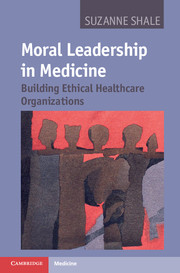Book contents
- Frontmatter
- Contents
- Preface
- Acknowledgements
- Chapter 1 Why medicine needs moral leaders
- Chapter 2 Creating an organizational narrative
- Chapter 3 Understanding normative expectations in medical moral leadership
- Prologue to Chapters 4 and 5
- Chapter 4 Expressing fiduciary, bureaucratic and collegial propriety
- Chapter 5 Expressing inquisitorial and restorative propriety
- Epilogue to Chapters 4 and 5
- Chapter 6 Understanding organizational moral narrative
- Chapter 7 Moral leadership for ethical organizations
- Appendix 1 How the research was done
- Appendix 2 Accountability for clinical performance: individuals and organizations
- Appendix 3 A brief guide to commonly used ethical frameworks
- Index
- References
Chapter 2 - Creating an organizational narrative
Published online by Cambridge University Press: 05 January 2012
- Frontmatter
- Contents
- Preface
- Acknowledgements
- Chapter 1 Why medicine needs moral leaders
- Chapter 2 Creating an organizational narrative
- Chapter 3 Understanding normative expectations in medical moral leadership
- Prologue to Chapters 4 and 5
- Chapter 4 Expressing fiduciary, bureaucratic and collegial propriety
- Chapter 5 Expressing inquisitorial and restorative propriety
- Epilogue to Chapters 4 and 5
- Chapter 6 Understanding organizational moral narrative
- Chapter 7 Moral leadership for ethical organizations
- Appendix 1 How the research was done
- Appendix 2 Accountability for clinical performance: individuals and organizations
- Appendix 3 A brief guide to commonly used ethical frameworks
- Index
- References
Summary
Leadership ultimately involves an ability to define the reality of others . . . . In managing the meanings and interpretations assigned to a situation, the leader in effect wields a form of symbolic power that exerts a decisive influence on how people perceive their realities and hence the way they act . . . [1]
In the skeleton argument I set out in Chapter 1, I proposed that moral leadership is a process of orchestrating a moral narrative that finds expression in group and organizational activity. This chapter is the first of four that will describe this sort of moral leadership in action. It supplies an overview of the process of creating moral narrative, from initial awareness that something troubling may be happening, through to full realization of a comprehensive and compelling narrative shaping organizational behaviour.
We will follow the moral narrative assembled by two clinicians who took action in response to their suspicions of potentially serious medical malpractice. Each of their narratives is unique to the circumstances that they confronted and, to some degree, themselves created. But these narratives have been selected as typical of the account medical leaders gave me of dealing with ‘moral trouble’ in general, and with this sort of ‘moral trouble’ in particular.
- Type
- Chapter
- Information
- Moral Leadership in MedicineBuilding Ethical Healthcare Organizations, pp. 33 - 65Publisher: Cambridge University PressPrint publication year: 2011



